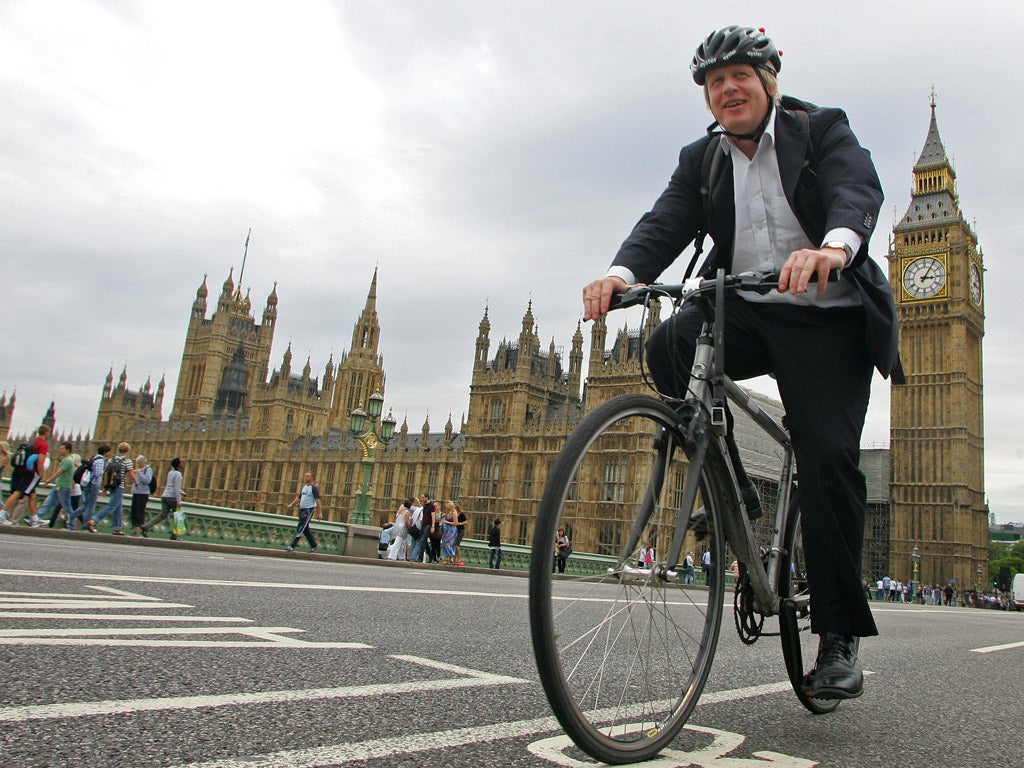Boris's comments on ‘hasty, rash, precipitous’ cyclists is classic government victim-blaming
Despite the recent deaths on London's roads, Johnson seems to believe that it is the personal choices of cyclists that determine their safety

Your support helps us to tell the story
From reproductive rights to climate change to Big Tech, The Independent is on the ground when the story is developing. Whether it's investigating the financials of Elon Musk's pro-Trump PAC or producing our latest documentary, 'The A Word', which shines a light on the American women fighting for reproductive rights, we know how important it is to parse out the facts from the messaging.
At such a critical moment in US history, we need reporters on the ground. Your donation allows us to keep sending journalists to speak to both sides of the story.
The Independent is trusted by Americans across the entire political spectrum. And unlike many other quality news outlets, we choose not to lock Americans out of our reporting and analysis with paywalls. We believe quality journalism should be available to everyone, paid for by those who can afford it.
Your support makes all the difference.The past nine days has seen five cyclists killed and more seriously injured on London's roads. Boris Johnson has been reported this morning to have warned against the 'hasty, rash, precipitous' decisions of cyclists themselves for putting their lives in danger.
Boris has form on this - when warned of the dangers for cyclists trying to navigate the thunderous roundabout at Elephant and Castle, he replied that it was 'fine...if you keep your wits about you'.
Johnson clearly believes that it is the personal choices, for good or ill, of cyclists that determine their safety on the roads. He refuses to acknowledge that there could be structural reasons why London is so dangerous for cyclists - poor road layout, traffic signals, very few separate cycle lanes - not to mention his own prioritisation of 'smooth flowing traffic' over bike safety. These are problems that are built into the environment, and determine the safety of a cycle journey far more than a cyclist's 'individual choice'.
In this he is only echoing the views of the government as a whole when it comes to considering structural inequality. Whether it's Michael Gove blaming users of food banks for 'not managing their finances', or Iain Duncan Smith arguing that those on benefits have failed to take 'responsibility' for their lives, the rhetoric is the same.
By ignoring the material conditions which shape people's lives - poverty, education, poor housing, inequality, unemployment - neoliberal ideology tries to pin the blame for such suffering on the victims themselves. Those who remain poor obviously haven't 'kept their wits about them' on the busy junctions of neoliberal capitalism.
Indeed, just today David Cameron argued that the hegemonic dominance of privately-educated people over almost every area of life in the UK – from politics to business to journalism – was due to a lack of 'aspiration' amongst working class people to 'get to the top'. As he once put it: 'it doesn't matter where you come from. It's where you are going that counts.' Class, poverty, a system that not only creates but relies upon inequality: none of that matters as long as you take the 'right' decisions.
But while the slow, grinding destitution which is the consequence of such ideological myopia might not generate the same headlines as the recent spate of deaths on the road, the consequences are ultimately just as fatal.
The only way that London can be made safer for cyclists is by a systematic restructuring of the road system, rerouting roundabouts, altering traffic signals and building proper cycle lanes. The same is true for inequality more widely: it is systemic change that is required, not the ideological pretence that the working class just need to be 'educated' to to make 'better' choices.
Join our commenting forum
Join thought-provoking conversations, follow other Independent readers and see their replies
Comments